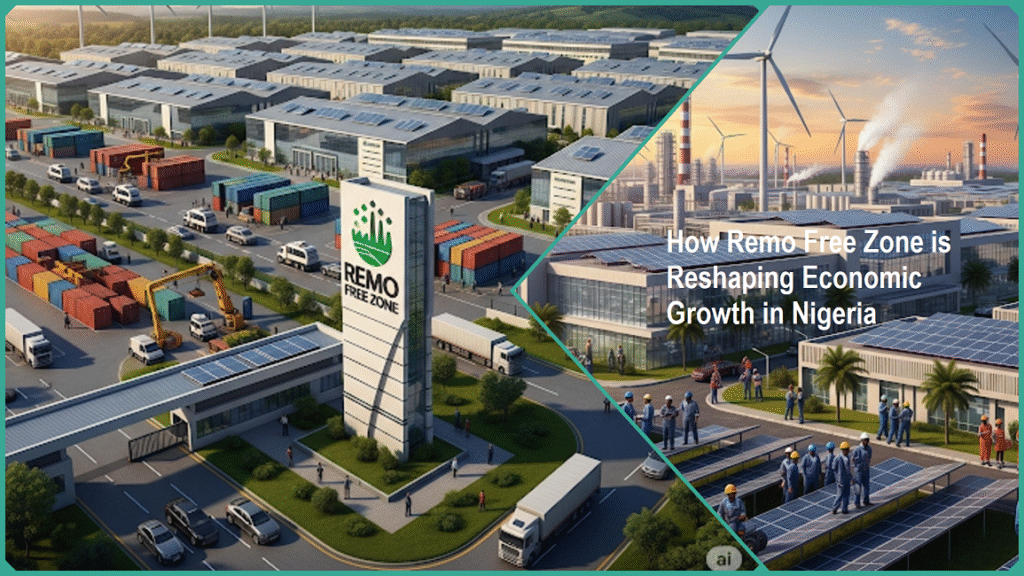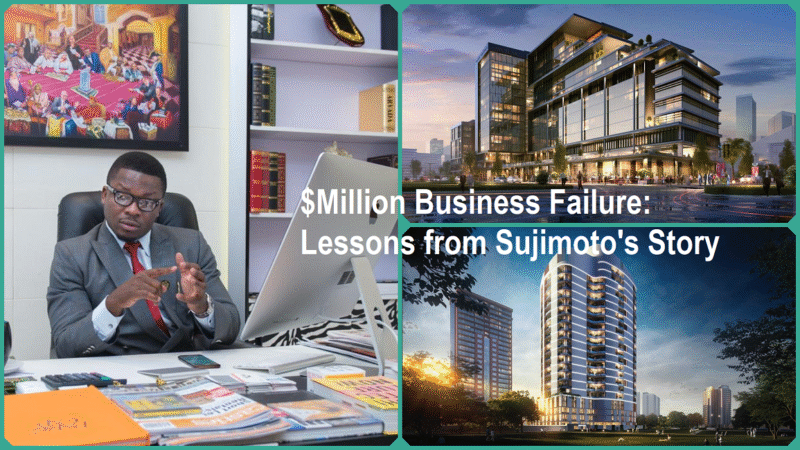How Remo Free Zone is Reshaping Economic Growth in Nigeria
Estimated reading time: 14 minutes
Nigeria is stepping boldly into a promising new era of sustained economic growth, with the Remo Free Zone (IPRFZ) positioned right at the center of this transformative journey. This development is far more than just another industrial park; it represents a carefully crafted and strategically planned ecosystem created to serve as a powerful catalyst for the nation’s long-term economic future.
For business leaders, investors, entrepreneurs, and job seekers alike, gaining a comprehensive understanding of this innovative and pioneering public-private partnership is essential to fully grasp the opportunities and potential it holds.

The IPRFZ’s unique combination of cutting-edge infrastructure, a highly skilled and adaptable workforce, and attractive competitive incentives is poised to fundamentally transform Nigeria’s industrial landscape. This transformation is expected to unlock a wide array of new opportunities for local manufacturing industries, generate substantial employment growth across various sectors, and attract significant levels of foreign direct investment, thereby boosting the overall economic development of the region.
Fundamental Concepts and Theories of Free Zones
A free zone, also known as a Special Economic Zone (SEZ), is a designated geographic area within a country where business and trade laws differ from the rest of the nation to encourage economic activity. These zones provide regulatory advantages such as tax breaks, customs duty exemptions, streamlined administrative procedures, and preferential tariffs.
The aim is to create an environment that promotes trade, investment, manufacturing, and export-oriented industrialization. By offering such incentives, SEZs attract both local and foreign investors, drive economic diversification, create jobs, and facilitate technology transfer and infrastructure development. SEZs often include enhanced infrastructure and dedicated management to support businesses operating within them.
The Remo Free Zone (IPRFZ) adopts a cluster-based model, where interconnected businesses from manufacturing, agro-processing, logistics, and service sectors coexist and share state-of-the-art infrastructure. This collective ecosystem fosters innovation, operational efficiency, and competitiveness in domestic and international markets.
By concentrating complementary industries close together, the Remo Free Zone leverages synergies that help reduce costs, improve supply chain coordination, and accelerate industrial growth. This approach aligns with global best practices for free zones, where integrated industrial clusters enhance value addition and export capacity.
In summary
- Free Zone/SEZ: A specifically designated geographic area that operates under a unique set of economic regulations and policies, created with the primary purpose of attracting both domestic and international investment. These zones are strategically designed to enhance and promote trade and business activities by offering a variety of financial incentives, tax exemptions, and simplified administrative procedures to encourage economic growth and development within the region.
- Remo Free Zone Model: A strategically designed cluster-based integrated industrial hub that brings together diverse sectors, including manufacturing, agro-processing, logistics, and various services. This innovative approach allows these industries to share critical infrastructure and resources, significantly enhancing operational efficiency and strengthening overall competitiveness in the market.
These unique features make free zones, such as Remo Free Zone, essential and powerful catalysts for driving economic growth, promoting industrialization, and generating a significant number of job opportunities in developing economies, including Nigeria. Their role is vital in accelerating economic development and transforming the industrial landscape in these regions.
Current Trends and Developments in Remo Free Zones
The current trends and ongoing developments surrounding the Remo Free Zone (IPRFZ) underscore a carefully and strategically planned, large-scale industrial ecosystem. This ambitious project is poised to significantly redefine Nigeria’s overall economic growth by leveraging integrated infrastructure, fostering a wide range of sectoral diversity, and generating a robust socioeconomic impact that will benefit various communities and industries across the nation.
Strategic Location and Integrated Ecosystem
Remo Free Zone is strategically located near Sagamu in Ogun State, about 50 kilometers away from Lagos, which is Nigeria’s primary economic center. This distance translates to less than an hour’s drive, making the zone easily accessible for businesses and investors.
The entire zone spans over 5,100 hectares, with the initial Phase 1 development covering approximately 2,000 hectares. Remo Free Zone enjoys excellent connectivity through major transportation networks, including well-maintained highways, nearby seaports, and the nearly completed Gateway International Cargo Airport.
This proximity to key logistics and transportation infrastructure significantly enhances the efficiency of import and export activities, establishing the zone as a vital gateway for companies looking to enter the Nigerian market as well as the wider West African and global markets.
Infrastructure and Services
The Free Zone proudly offers world-class and highly reliable infrastructure, which distinctly includes the following key features:
- A reliable and dedicated gas-powered electricity supply system designed specifically to consistently meet the high and varying demands of industrial operations. This stable energy source ensures uninterrupted power essential for maintaining production efficiency and supporting large-scale industrial activities.
- Extensive and well-maintained road networks are established throughout the zone, ensuring efficient and smooth internal mobility for all users. These broad roads facilitate easy transportation and connectivity within the area, significantly enhancing the overall accessibility and convenience for residents, businesses, and visitors alike.
- Comprehensive security services are integrated seamlessly with advanced modern telecommunications infrastructure, ensuring robust protection and reliable connectivity across all platforms.
- Comprehensive and fully integrated utilities provision encompassing essential services such as gas supply, clean water distribution, and advanced wastewater treatment facilities designed to ensure environmental sustainability and public health.
- On-site administrative and emergency services are available, including customs clearance facilities, well-equipped fire stations, and a constant police presence. These essential services work together efficiently to expedite business operations while ensuring the highest level of safety and security for all personnel and assets within the area.
Sectoral Focus: High-Impact Industries
Remo Free Zone strategically targets a wide and diverse range of industries, all carefully selected to maximize value addition and significantly enhance export capacity. This approach is designed to foster economic growth by attracting businesses from various sectors, thereby creating a dynamic and multifaceted industrial environment that supports sustainable development and global trade expansion.
- Agro-processing: This initiative places a strong emphasis on several key Nigerian agricultural products, including cassava, cashew, soya, ginger, maize, sesame, and groundnuts, which are vital to the country’s economy. The zone is strategically designed to align closely with Nigeria’s broader agricultural development goals by actively promoting and encouraging the processing of these raw materials within local communities. This approach not only supports local farmers and businesses but also enhances value addition, creates employment opportunities, and reduces dependency on imported processed goods, thereby contributing significantly to the nation’s economic growth and sustainability.
- Light and Heavy Manufacturing: This sector encompasses a wide range of industries, including the production of fast-moving consumer goods (FMCG), textiles, pharmaceuticals, chemicals, construction materials, steel, aluminum, glass, and ceramics. It involves both small-scale and large-scale manufacturing processes, covering everything from everyday household products to essential industrial materials.
- Recycling and Renewables: Effective waste management, advanced plastics recycling techniques, and innovative renewable energy solutions play a crucial and integral role in the zone’s comprehensive environmental responsibility agenda, ensuring sustainability and ecological balance for the future.
- Logistics and Warehousing: Benefiting greatly from its proximity to the Gateway International Cargo Airport, the zone is ideally positioned to support highly efficient storage, meticulous handling, and seamless distribution of a wide range of goods. This strategic location ensures that all logistics operations are streamlined, reducing transit times and enhancing overall supply chain effectiveness.
Investment and Incentives
The Remo Free Zone is supported by a substantial financial commitment that underscores its ambitious development goals: it begins with an initial investment of $400 million, with a strategic aim to attract and secure over $1 billion in foreign direct investment (FDI) over time.
To effectively attract new investors and ensure the retention of existing ones, the zone provides a wide-ranging and comprehensive package of incentives designed to meet diverse business needs:
- Exemptions from taxes, levies, and customs duties are provided for enterprises that meet specific qualifying criteria. These exemptions are designed to support and encourage the growth of qualifying businesses by reducing their financial burdens. Such benefits may include full or partial relief from various forms of taxation, including corporate taxes, local levies, and import or export customs duties. By granting these exemptions, the government aims to create a more favorable environment for eligible enterprises to thrive and contribute to economic development.
- A comprehensive Single Window Clearance system designed to efficiently streamline all planning permits and paperwork processes, significantly reducing bureaucratic delays and complexities. This system simplifies approvals by providing a unified platform for various regulatory requirements, thereby enhancing overall efficiency and saving valuable time for businesses and individuals alike.
- Preferential tariffs are implemented as a strategic measure to encourage the importation of essential inputs while simultaneously promoting the export of finished products. These tariffs are designed to reduce the cost burden on businesses by lowering import duties on raw materials and components needed for production. By doing so, companies can source high-quality inputs more affordably, which enhances their competitiveness in both domestic and international markets. Additionally, preferential tariffs on exports help in making finished goods more attractive and competitively priced in foreign markets, thereby boosting export volumes and supporting the overall growth of the manufacturing sector. This dual approach fosters a more favorable trade environment, stimulates economic development, and helps integrate local industries into global value chains.
- Expatriate quota waivers, along with the complete freedom for full profit repatriation, significantly enhance the overall ease of doing business for foreign investors. These measures provide a more flexible and attractive environment, allowing foreign investors to operate with fewer restrictions and more confidence in their financial returns.
- Customized and specifically designed support services aimed at enhancing workforce recruitment processes and streamlining operational facilitation for improved efficiency and effectiveness.
Socioeconomic Impact
The development of Remo Free Zone is positioned to produce significant and far-reaching socioeconomic benefits for the surrounding communities and the broader region. This initiative is expected to create numerous opportunities for economic growth and social advancement, impacting various sectors positively.
- Job Creation: The zone is designed to generate approximately 40,000 direct jobs during its initial phase alone, with operations expected to significantly ramp up between 2025 and 2026. Looking beyond the initial phase and extending its impact across the entire African continent, the project is projected to create more than one million jobs in the long term. This growth will play a crucial role in supporting Nigeria’s large and youthful labor force while effectively addressing ongoing unemployment challenges throughout the region.
- Industrialization and Economic Diversification: By effectively transforming raw materials into a wide range of high-value-added products, Remo Free Zone plays a crucial role in fostering and strengthening regional value chains. This process significantly boosts diversified non-oil exports from the region, contributing to a more varied and resilient economic structure. Furthermore, these activities substantially enhance Nigeria’s internal revenue potential by expanding the tax base and creating new revenue streams beyond the traditional oil sector.
- Environmental Responsibility: The project thoughtfully integrates extensive green spaces and innovative renewable energy initiatives, fully aligning with the United Nations’ Sustainable Development Goals. It also supports Nigeria’s strong commitment to promoting sustainable industrialization and environmental stewardship, ensuring long-term ecological balance and community well-being.
In Summary
The Remo Free Zone represents a comprehensive and holistic economic platform that is firmly underpinned by a combination of strategic geographic location, robust and modern infrastructure, targeted sector-specific growth initiatives, highly attractive incentives, and significant socioeconomic potential.
Together, these elements position the zone as a vital and critical driver for Nigeria’s industrial development and overall economic future, playing a key role in shaping the nation’s growth trajectory and prosperity.
FAQs
What makes Remo Free Zone unique compared to other free zones in Nigeria?
Remo Free Zone stands out due to its world-class infrastructure and comprehensive utility services—including reliable gas-powered electricity, water, wastewater treatment, and modern telecommunications. It features on-site customs and security services, significantly reducing bureaucratic delays.
Its strategic location near Lagos, Nigeria’s commercial hub, and key transport corridors like highways, seaports, and the Gateway International Cargo Airport makes it a prime logistics and manufacturing hub.
Additionally, it adopts an integrated cluster approach, bringing together agro-processing, manufacturing, logistics, and commercial activities in one coherent ecosystem, which drives innovation, shared efficiencies, and regional competitiveness.
What incentives are available for businesses investing in the Remo Free Zone?
Businesses benefit from a robust set of incentives designed to lower operating costs and simplify administrative processes:
- Full exemptions from taxes, levies, and customs duties on qualifying goods and operations.
- A Single Window Clearance system accelerates permit approvals and regulatory compliance, reducing red tape.
- Expatriate quota waivers make it easier to employ foreign experts.
- Freedom for full profit repatriation enables investors to transfer earnings abroad without restrictions.
- Preferential tariff rates facilitate the import of raw materials and the export of finished goods.
- Customized investor support services, including workforce recruitment assistance.
What types of businesses are being prioritized for the zone?
Remo Free Zone places a strong emphasis on prioritizing key sectors that contribute substantial value to the economy and actively promote the diversification of industrial activities. These sectors include, but are not limited to:
- Agro-processing industries are focusing on Nigeria’s key agricultural commodities like cassava, cashew, maize, and soya.
- Light and heavy manufacturing industries include textiles, pharmaceuticals, chemicals, steel, aluminum, glass, and ceramics.
- Recycling and renewable energy companies are focusing on sustainable waste management and plastics processing.
- Logistics, warehousing, and related service industries, enabled by proximity to transport infrastructure.
How will Remo Free Zone impact job creation and skill development?
The zone aims to create approximately 40,000 direct jobs during its initial phase, scaling to over one million jobs across the continent as expansion continues. It will foster skill development by:
- Recruiting skilled technical and managerial personnel.
- Collaborating with local educational and vocational institutions for training and upskilling programs.
- Encouraging knowledge transfer and professional growth within industries operating in the zone.
This approach effectively nurtures and develops a highly skilled and competent workforce that is thoroughly prepared and equipped to meet the ever-evolving demands and challenges of the modern industrial and technological sectors in Nigeria.
How can entrepreneurs and SMEs get involved in the Remo Free Zone?
Entrepreneurs and small-to-medium enterprises (SMEs) have numerous opportunities to actively participate by engaging in the following activities:
- Applying for land leases or business premises within the zone through the zone’s administrative office.
- Accessing business support services that assist with regulatory compliance, permits, and operational guidance.
- Exploring partnership and joint venture opportunities with larger zone tenants or platform operators.
- Leveraging specialized programs and incentives designed to lower barriers to entry and promote growth.
Support agencies operating within the Free Zone offer a wide range of valuable services, including expert advice on various funding options, guidance on accessing new and existing markets, and comprehensive technical assistance.
These resources are specifically designed to help small and medium-sized enterprises (SMEs) overcome challenges and successfully grow their businesses, ensuring their long-term sustainability and prosperity.
In Conclusion
The Remo Free Zone is quickly establishing itself as a flagship initiative propelling Nigeria’s next wave of economic growth. Far beyond being just a geographical location, it represents a dynamic ecosystem engineered to accelerate industrialization, create substantial employment opportunities, attract foreign direct investment (FDI), and facilitate technological leapfrogging in multiple sectors.
For business leaders and investors, the Remo Free Zone offers a rare combination of world-class infrastructure, strategic incentives, and integrated sectoral clusters that enable scalable growth and innovation. Entrepreneurs and career builders stand to benefit immensely from the zone’s capacity to nurture in-demand skills and provide a fertile ground for launching ventures capable of competing on a global stage.
As Nigeria charts its future course towards diversified economic development, sustainable industrialization, and regional leadership, the Remo Free Zone emerges as a powerful model of successful public-private partnership, forward-thinking policy, and inclusive growth. It’s a comprehensive industrial platform that serves as a blueprint worth emulating, studying, and—most importantly—joining.
Engage with us: What potential do you see for the Remo Free Zone in reshaping your business strategy or career trajectory?
Share your thoughts in the comments below, subscribe for ongoing industry insights, and connect with like-minded professionals and investors to explore future opportunities together. Early-stage manufacturing plants at Remo Free Zone underscore the tangible progress toward scalable infrastructure and growing investor confidence.
Discover more from Skill to Grow
Subscribe to get the latest posts sent to your email.






